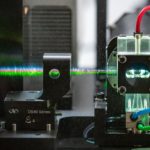Lien vers Pubmed [PMID] – 22464673
J. Allergy Clin. Immunol. 2012 Apr;129(4):1020-30
BACKGROUND: Given their pivotal role in the polarization of T-cell responses, molecular changes at the level of dendritic cells (DCs) could represent an early signature indicative of the subsequent orientation of adaptive immune responses during immunotherapy.
OBJECTIVE: We sought to investigate whether markers of effector and regulatory DCs are affected during allergen immunotherapy in relationship with clinical benefit.
METHODS: Differential gel electrophoresis and label-free mass spectrometry approaches were used to compare whole proteomes from human monocyte-derived DCs differentiated toward either regulatory or effector functions. The expression of those markers was assessed by using quantitative PCR in PBMCs from 79 patients with grass pollen allergy enrolled in a double-blind, placebo-controlled clinical study evaluating the efficacy of sublingual tablets in an allergen exposure chamber over a 4-month period.
RESULTS: We identified several markers associated with DC1 and/or DC17 effector DCs, including CD71, FSCN1, IRF4, NMES1, MX1, TRAF1. A substantial phenotypic heterogeneity was observed among various types of tolerogenic DCs, with ANXA1, Complement component 1 (C1Q), CATC, GILZ, F13A, FKBP5, Stabilin-1 (STAB1), and TPP1 molecules established as shared or restricted regulatory DC markers. The expression of 2 of those DCs markers, C1Q and STAB1, was increased in PBMCs from clinical responders in contrast to that seen in nonresponders or placebo-treated patients.
CONCLUSION: C1Q and STAB1 represent candidate biomarkers of early efficacy of allergen immunotherapy as the hallmark of a regulatory innate immune response predictive of clinical tolerance.

